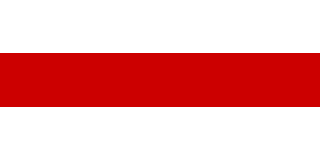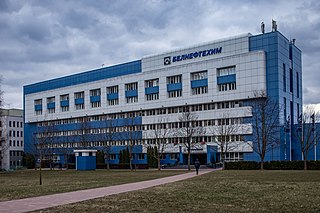
The Belarusian Agrarian Party was an agrarian socialist political party in Belarus. It supported the government of Alexander Lukashenko. The leader of the party was Mikhail Rusy, who succeeded Mikhail Shimansky on 15 March 2008.

The Communist Party of Belarus is a communist and Marxist–Leninist political party in Belarus. The party was created in 1996 and supports the government of president Alexander Lukashenko. The leader of the party is Aliaksiej Sokal. The party has had more seats in the National Assembly of Belarus than any other party since the 2000 Belarusian parliamentary election, the first national election it participated in. However, most seats in the Belarusian legislature are held by independent politicians.

The national emblem of Belarus features a ribbon in the colors of the national flag, a silhouette of Belarus, wheat ears and a red star. It is sometimes referred to as the coat of arms of Belarus, although in heraldic terms this is inaccurate as the emblem does not respect the rules of conventional heraldry. The emblem is an allusion to one that was used by the Byelorussian SSR, designed by Ivan Dubasov in 1950, with the biggest change being a replacement of the Communist hammer and sickle with a silhouette of Belarus. The Belarusian name is Dziaržaŭny hierb Respubliki Biełaruś, and the name in Russian is Gosudarstvennyĭ gerb Respubliki Belarusʹ.

The Liberal Democratic Party of Belarus is a political party in Belarus. It was created in 1994 as the Belarusian successor of the Liberal Democratic Party of the Soviet Union.

Belarus and Lithuania established diplomatic relations on 24 October 1991, shortly after the dissolution of the Soviet Union. The two countries share 680 kilometres (420 mi) of common border. Lithuania's border with Belarus is the country's longest border. For Belarus it is its 3rd-longest border.

The Belarusian opposition consists of groups and individuals in Belarus seeking to challenge, from 1988 to 1991, the authorities of Soviet Belarus, and since 1995, the leader of the country Alexander Lukashenko, whom supporters of the movement often consider to be a dictator. Supporters of the movement tend to call for a parliamentary democracy based on a Western model, with freedom of speech and political and religious pluralism.

The modern-day characteristics of women in Belarus evolved from the events that happened in the history of Belarus, particularly when the "concept of equal rights for women was first developed and substantiated in the late 16th century". The so-called Grand Duchy Charter of 1588 – one of the most important legal documents in Belarusian history – protected the dignity of Belarusian women under the law. Women in Belarus and their contribution to Belarusian society is celebrated annually on 8 March, during International Women's Day.
Events in the year 2020 in Belarus.

The 2020–2021 Belarusian protests were a series of mass political demonstrations and protests against the Belarusian government and President Alexander Lukashenko. The largest anti-government protests in the history of Belarus, the demonstrations began in the lead-up to and during the 2020 presidential election, in which Lukashenko sought his sixth term in office. In response to the demonstrations, a number of relatively small pro-government rallies were held.

Sviatlana Hieorhiyeuna Tsikhanouskaya is a Belarusian political activist. After standing as a candidate in the 2020 presidential election against the president Alexander Lukashenko, she has led the political opposition to his authoritarian rule through an oppositional government operating from Lithuania and Poland.

Maria Kalesnikava is a Belarusian professional flautist and political activist. In 2020, she headed Viktar Babaryka's electoral campaign during presidential elections of 2020 in Belarus. Kalesnikava represented the united campaign of Sviatlana Tsikhanouskaya, then she became a member of the presidium of the Coordination Council formed during the 2020 Belarusian protests in opposition to the regime of Alexander Lukashenko. She is also a founder of the 'Razam' political party.

A constitutional referendum was held in Belarus on 27 February 2022. The referendum was ordered by President Alexander Lukashenko in January 2022. According to political analysts, changes to the Belarusian constitution were intended to solidify the power of Lukashenko's regime after the mass protests in 2020 and 2021, which challenged his rule and was brutally suppressed by police. More than 35,000 people were arrested, 1,070 of whom are acknowledged political prisoners. The changes to the Constitution allow Lukashenko to remain in office until 2035 and empower the All-Belarusian People's Assembly, an extra-parliamentary body dominated by government supporters. The changes also renounced Belarus's nuclear-free zone status, allowing Belarus to host nuclear weapons for the first time since the fall of the Soviet Union; the lead-up to the referendum occurred as Russia amassed its troops in both Russia and Belarus in the prelude to the Russian invasion of Ukraine, and the election itself was held several days after Russia began its military offensive into Ukraine.
Aliaksandr Shakutsin is a Belarusian businessman, allegedly close to Belarusian president Alexander Lukashenko. Media widely characterize Shakutsin as an oligarch. On 17 December 2020, the Council of the European Union imposed sanctions on him.

Belneftekhim is an association of petrochemical companies in Belarus, subordinated to the Council of Ministers. It manages these companies and regulates several aspects of the petrochemical sector, including setting retail prices for gasoline.

Roman Dmitriyevich Protasevich or Raman Dzmitryevich Pratasevich is a Belarusian blogger and political activist. He was the editor-in-chief of the Telegram channel Nexta and chief editor of the Telegram channel Belarus of the Brain.

Community of Railway Workers of Belarus is a Belarusian opposition initiative of railway workers, recognized by the Belarusian authorities as an extremist formation.

The United Transitional Cabinet of Belarus is a government in exile for Belarus that was formed in August 2022.
Parliamentary elections were held in Belarus on 25 February 2024. The country elected 110 deputies to the lower house of parliament and about 12,000 representatives of local councils.
The Belarusian Investigative Center (BIC) is an independent media outlet from Belarus that operates in exile. The center offers five core types of content: investigative journalism, fact-checking, analytical reporting, news, and economic analysis.












